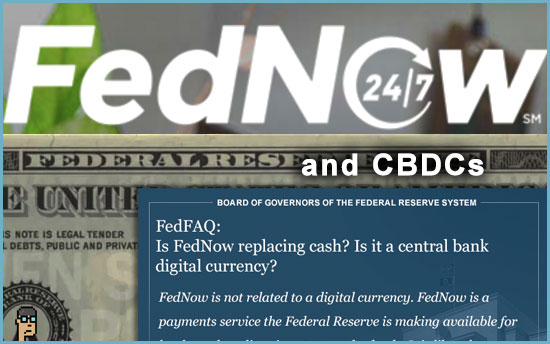Here’s today’s blockchain tipsheet… prefer it by email? Sign up here.
FedNow and CBDCs
The U.S. Federal Reserve slid out an “FAQ” on Friday regarding its new FedNow payment system. Among the brief series of questions and answers, the Fed tries to debunk the idea that FedNow is replacing cash or has anything to do with a Central Bank Digital Currency (CBDC). It’s an “instant payment system” launching this July.
In the FAQ, the Fed reiterates previous statements on its CBDC strategy saying, “The Federal Reserve has made no decision on issuing a [CBDC] and would not do so without clear support from Congress and the executive branch, ideally in the form of a specific authorizing law. A CBDC would not replace cash or other payment options.” Read the FAQ.
Circle’s Head of Global Policy Dante Disparte tweeted about the FAQ saying it was “a useful myth busting FAQ from the @federalreserve.” Read more.
Meanwhile, on the Unchained podcast last week, Majority Whip Rep. Tom Emmer (R, MN) remains skeptical about FedNow and CBDCs. On FedNow, Emmer said, “Let the private sector do this stuff. This is our government once again trying to compete with the private sector. This is our government once again, I believe, controlling all finance. You control the money, you control the water -and you control the people. This is literally what defines our freedom, our financial system in our country – our ability to create an idea and then go out and solicit startup capital. By the way, I should not need my government’s permission or oversight to go out and seek that. That’s the definition of freedom in this country.” Hear the podcast.
about Treasury’s DeFi report
Last Thursday’s release of an assessment by U.S. Treasury arguing that DeFi (decentralized finance) is a conduit for illicit finance and is basically not decentralized continues to ripple across the digital assets industry. The report builds on previous responses to President Joe Biden’s digital assets Executive Order in March of 2022 which have maintained a mostly negative view about digital assets innovation and its potential.
On the CoinCenter blog this past Friday, director of research Peter Van Valkenburgh wasted no time with a response to Treasury’s DeFi “take.” Titled, “Treasury’s new DeFi risk assessment relies on ill-fitting frameworks and makes potentially unconstitutional recommendations,” Van Valkenburgh identifies what he sees as “The Good,” “The Bad” and “The Ugly.” Read it.
no bank for Binance.US
In the wake of the collapse of its banking partner, Signature Bank, and its Signet platform, Binance.US is having trouble finding a bank for onboarding its U.S. customers. As The Wall Street Journal explained on Saturday, the trouble stems from an overall perception of regulatory risk for banks. But specifically, “[the] key difficulty for Binance.US is finding a bank to directly hold its customers’ dollars. At crypto exchanges, bank accounts for user deposits and trading are typically separate from those used for corporate operations, such as payroll and one-off expenses.” Read more.
Is the inability for Binance.US to get a bank part of a Choke Point 2.0 strategy by the U.S. government? The WSJ isn’t going that far. But, the Commodity Futures Trading Commission (CFTC) daunting enforcement action in late March against Binance.US’s parent likely does not help.
states supporting mining
The Satoshi Action Fund, co-founded by Bitcoin advocate Dennis Porter, tweeted about new legislation just passed by Arkansas providing for a “Right to Mine” digital assets with a bill called “Arkansas Data Centers Act of 2023.”
Among the bills industry-friendly requirements, “A person that is engaged in home digital asset mining or that has a digital asset mining business shall not be considered a money transmitter under the Uniform Money Services Act . (…) Discrimination against digital asset mining business prohibited.” Read more on BitcoinMagazine.com. Next step is the signature of Arkansas Governor Sarah Huckabee Sanders (R).
more tips:
Arkansas Data Centers Act of 2023 – state.ar.us
working at a regulator
DC finance publication Capitol Account says that working at the Securities and Exchange Commission (SEC) may not be the grind once thought given a new report from Partnership for Public Service and Boston Consulting Group. Released last week, the SEC comes in at #3 among similarly-sized agencies in the U.S. government – that’s 6 spots ahead of The Smithsonian.
“The SEC chief [Gary Gensler] has come under a lot of fire – from lawmakers and the agency’s own inspector general – for relentlessly driving the staff to write dozens of new regulations. But despite reports of increased attrition and exhausted managers, it turns out that the workforce is actually pretty content.” Read more on Capital Account.
more tips:
Best Places to Work in the Federal Government for 2022 – BestPlacesToWork.org
still more tips
FTX Debtors Release Report on FTX Group’s Control Failures – press release
Paxos’s dreams of a national banking charter died last week of extreme old age – The Block
Binance and Coinbase Have Been Sucked Into a Regulatory Turf War – Wired
Opinion – Crypto Migration: European And Asian Regulators Welcome Crypto Innovation While U.S. Cracks Down – Forbes
Inside the international sting operation to catch North Korean crypto hackers – CNN
If you would like this delivered as a newsletter, please sign up here.

